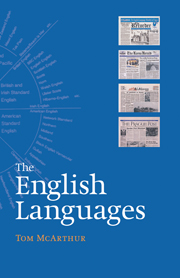Summary
o As for the antiquitie of our speche, whether it be measured by the ancient Almane, whence it cummeth originallie, or euen but by the latest terms which it boroweth daielie from foren tungs…, it cannot be young. Onelesse the Germane himself be young, which claimeth a prerogatiue for the age of his speche, of an infinit prescription: Onelesse the Latin and Greke be young, whose words we enfranchise to our own vse.
(Richard Mulcaster, in chapter XIII of The First Part of the Elementarie, 1582)o The two languages from which our primitives have been derived are the Roman and the Teutonick: under the Roman I comprehend the French and provincial tongues; and under the Teutonick ränge the Saxon, German, and all their kindred dialects. Most of our polysyllables are Roman, and our words of one syllable are very often Teutonick.
(Samuel Johnson, in the preface to A Dictionary ofthe English Language, London: 1755)The future of English: Another Latin?
In the first iss English Today, the British EFL textbook-writer and teachertrainer Alan Maley observed with regard to the future of the language:
One possible scenario for English as an international language is that it will succumb to the same fate as Latin did in the Middle Ages. That is, that the regional varieties will develop independently to the point where they become different languages rather than varieties of the same language.
(The most chameleon of languages: Perceptions of English Abroad', English Today 1, January 1985, p. 31)The same year saw the publication of the paper which Randolph Quirk presented at the British Council Conference in London in 1984 (as discussed in chapter 3). In it, Quirk considers the same possibility:
Few today would suggest that there was a Single Standard of English in the world. There are few enough (not least among Professional linguists) that would claim the existence of a Single Standard within any one of the ENL countries: plenty that would even deny both the possibility and the desirability of such a thing. Recent emphasis has been on multiple and variable Standards (insofar as the use of the word ‘Standard’ is ventured): different Standards for different occasions for different people - and each as ‘correct’ as any other.
- Type
- Chapter
- Information
- The English Languages , pp. 180 - 196Publisher: Cambridge University PressPrint publication year: 1998



